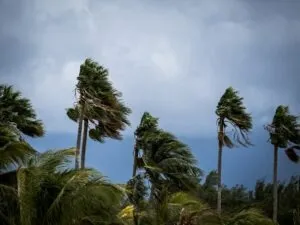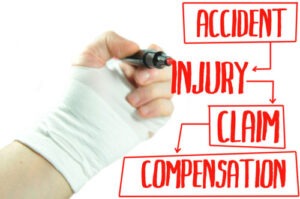
As Floridians, we know hurricanes are an inevitable part of life. Each year, these storms bring destructive winds, torrential rain, and flooding, threatening both our homes and our peace of mind. While we can’t stop hurricanes, we can take steps to protect our property and ensure that, in the event of a hurricane-related claim, we are well-prepared to work with insurance companies for the compensation we deserve.
At Viles & Beckman, we’re more than just personal injury attorneys; we are your advocates in every storm, whether that’s in the courtroom or against the insurance companies. In partnership with some of the most skilled hurricane attorneys in the country, we help clients navigate the complexities of hurricane property damage claims. This article will guide you through the best practices for protecting your home before a hurricane and how to be ready to file an effective claim should damage occur.
Why Preparation is Key Before a Hurricane


Expect More, Receive More: Legal Support That Feels Like Family
The best time to prepare for a hurricane is long before one is on the horizon. By taking the necessary precautions, you can protect both your property and your financial well-being. Insurance claims can be complicated and time-consuming, especially when thousands of homeowners are filing claims simultaneously after a major storm. However, with proper documentation and preparation, you’ll be in a much better position to expedite your claim and secure a fair settlement.
Florida’s history with hurricanes is long, and so are the stories of policyholders battling with insurance companies to get what they are owed. Having a plan and being thorough in your preparations is the key to a smoother claims process.
Steps to Protect Your Property Before a Hurricane
- Take Photos and Videos of Your Home
Before a storm hits, one of the most important things you can do is to thoroughly document the current state of your property. Walk around your home, inside and out, and take clear photos and videos of every room, your furniture, appliances, electronics, and structural features. Focus on key areas that are likely to sustain damage, like the roof, windows, doors, and exterior walls.
Ensure you capture images of:
- The exterior of your home from multiple angles, including the roof, doors, windows, and any landscaping or outdoor structures.
- Every room inside your home, focusing on large or high-value items like appliances, electronics, and furniture.
- Your garage or any detached buildings on your property.
- Any fences, sheds, pools, or other outdoor features.
This documentation will be critical if you need to file an insurance claim, as it will provide proof of your property’s condition before the storm.
- Create a Detailed Home Inventory
Along with photos, it’s vital to keep an updated inventory of all your belongings. Make a list of everything inside your home, including its value, purchase date, and receipts or proof of purchase if possible. This step might seem tedious, but it’s a lifesaver if you need to file a claim for damaged or destroyed items.
If you don’t have receipts for some of your belongings, don’t worry. Take notes on the make, model, and age of items like appliances, electronics, and furniture. For high-value items like jewelry, artwork, or collectibles, consider getting them appraised so you have an accurate value to report to your insurance company.
Some helpful tools to keep track of your inventory include:
- Mobile apps specifically designed for home inventories.
- A simple spreadsheet that lists items by room.
- Cloud storage to keep digital copies of important documents and receipts.
By keeping your inventory updated and safely stored, you’ll be better prepared to file a claim for any losses.
- Secure Your Home Against Wind and Water
Hurricane-force winds can cause catastrophic damage to your home, but there are steps you can take to minimize that risk:
- Install Hurricane Shutters: If you live in a hurricane-prone area, installing hurricane shutters can help protect your windows from flying debris. If you don’t have shutters, you can board up your windows with plywood.
- Reinforce Your Doors and Garage: Weak points like doors and garage doors are often the first areas to fail during a storm. Consider upgrading to impact-resistant doors or installing a garage door brace.
- Trim Trees and Secure Outdoor Items: Loose branches and unsecured items like patio furniture, grills, and lawn equipment can become dangerous projectiles during a storm. Trim back any large trees near your home and bring in any outdoor items before the storm hits.
- Check Your Roof and Gutters: Make sure your roof is in good condition and repair any loose shingles or tiles. Clean out your gutters to ensure proper drainage, which can prevent water from backing up and flooding your home.
Taking these precautions can not only minimize damage but also help you avoid disputes with your insurance company about whether damage was preventable.
- Review and Understand Your Insurance Coverage
Many Florida homeowners don’t realize that standard homeowners’ insurance policies often don’t cover flood damage—one of the most common consequences of a hurricane. Check your policy to see what is and isn’t covered, and make sure you have the necessary flood and windstorm coverage. You may need to purchase additional policies or endorsements to ensure your home is fully protected.
Some key things to look for in your policy include:
- Hurricane Deductibles: In Florida, many policies include separate deductibles for hurricane-related claims, which can be higher than your standard deductible. Make sure you know what your deductible is and have a plan to cover it if necessary.
- Exclusions for Flood and Wind Damage: If your policy excludes flood or wind damage, consider purchasing separate flood insurance through the National Flood Insurance Program (NFIP) or a private insurer, and a windstorm policy if needed.
- Coverage Limits: Review your policy’s coverage limits to ensure they are high enough to cover the cost of rebuilding or repairing your home after a major hurricane.
If you’re unsure about your coverage, this is a good time to consult with a professional to help review your policy and make any necessary adjustments before hurricane season.
Filing a Hurricane Insurance Claim: What to Do After the Storm
After the hurricane has passed and it’s safe to do so, the first thing you should do is assess the damage and begin documenting everything.
- Document All Damage Thoroughly
Take new photos and videos of any damage to your home. Focus on the areas you documented before the storm so you can provide “before and after” evidence to your insurance company. Be sure to capture:
- Damage to the exterior, including the roof, walls, windows, and doors.
- Interior damage from water leaks or flooding.
- Any destroyed or damaged belongings, furniture, and appliances.
The more thorough your documentation, the stronger your claim will be.
- Make Temporary Repairs to Prevent Further Damage
While you wait for your insurance company to process your claim, it’s important to make temporary repairs to prevent further damage. For example, if your roof was damaged, you should cover it with a tarp to stop water from getting in. If you don’t take steps to mitigate further damage, your insurance company may reduce or deny your claim.
Keep all receipts for any materials or labor used in these temporary repairs so you can include them in your claim.
- File Your Claim as Soon as Possible
Insurance companies are often flooded with claims after a hurricane, so the sooner you file, the better. Contact your insurance company as soon as you’ve documented the damage and are ready to begin the claims process.
When filing your claim, be prepared to provide:
- Your home inventory and documentation of damaged items.
- Photos and videos of the damage.
- Receipts and records for any temporary repairs.
- A detailed description of the damage and any expenses you’ve incurred.
Stay organized and keep copies of all communications with your insurance company, including emails and letters.
- Be Persistent and Consider Legal Help
Unfortunately, many homeowners find themselves in disputes with their insurance companies over hurricane claims. Common issues include delays, underpayments, and outright denials of legitimate claims.
At Viles & Beckman, we’ve partnered with top hurricane attorneys to help our clients navigate these challenges. If your insurance company is dragging its feet or refusing to pay what you’re owed, we can help. We know the tactics insurance companies use to minimize payouts, and we’ll fight for the compensation you deserve.
Protecting Your Future After the Storm
No one wants to go through the stress of dealing with hurricane damage, but being prepared and knowing your rights can make the process much smoother. At Viles & Beckman, we treat our clients like family, and we’re here to guide you through the insurance claims process every step of the way. From preparing your property ahead of time to advocating for you if your claim is delayed or denied, we are committed to ensuring you get the help and compensation you deserve.
If you need assistance with a hurricane-related insurance claim, don’t hesitate to reach out to our team. Contact us today for a free consultation and let us help you rebuild and recover. With the right preparation and support, you can weather any storm.






